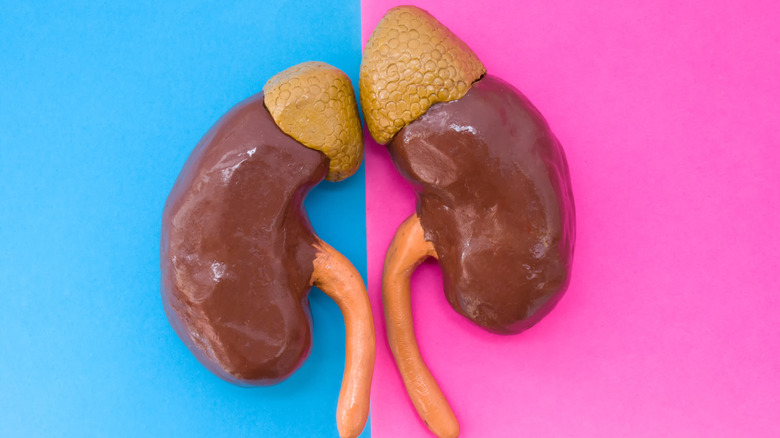Can Your Gender Predict How Well Your Kidneys Will Function As You Age?
Kidneys play an important role in bodily functions across genders. They're so vital that there are two kidneys in the human body with the mission to eliminate both excess fluids and waste products. Other major functions include balancing the body fluids, removing drugs, secreting hormones to manage blood pressure, supporting bone health, and regulating red blood cell production (via National Kidney Foundation).
However, as aging occurs, kidney functions often decline. Aging women are more likely to develop chronic kidney disease, while men are more prone to exhibit problems with kidney failure, points out U.S. News & World Report. This discrepancy suggests gender may play a role, but why?
According to a new study published in the Journal of the American Society of Nephrology, the disparity in rates of chronic kidney disease (CKD) may be attributed to disparities in access to health care and differing rates of kidney function decline across sexes.
Study author Dr. Toralf Melsom explains, "This study is the first study that repeats accurate measurements of kidney function in relatively healthy women and men during aging. By doing so, we provide important knowledge regarding age-related loss of kidney function and sex disparities in the prevalence of CKD" (via U.S. News & World Report).
What the researchers found
For the researchers to properly analyze kidney function, the study used a complicated method. "Because the common method to estimate kidney function using creatinine levels in the blood is inaccurate and unreliable, we measured the kidney function by intravenous injection of a kidney filtration marker — the contrast media iohexol [iodine]. A blood sample was collected three to four hours later to calculate the kidney filtration rate," says Dr. Melsom (via U.S. News & World Report).
In total, the study lasted 13 years. Out of the 1,837 participants, 53% were women aged between 50-62 years old. Participants were from Northern Europe and could not have self-reported heart disease, chronic kidney disease, or diabetes (per Journal of the American Society of Nephrology).
During the 13 years, the researchers measured kidney function at three different times: 2007-2009, 2013-2015, and 2018-2020. The first time period indicated that kidney functions in women were lower than in men (via American Society of Nephrology). But as the researchers continued measuring over the years, they found more gender disparities. Women have a linear and slower kidney function decline rate as they age, whereas men's kidney function drops more rapidly.
While aging is natural, there are ways to support your overall health — and that of your kidneys — regardless of gender. Making healthy food choices, exercising, reducing stress, and getting quality sleep can all promote well-being. Still, if you're concerned about your kidney health, talk to your doctor.


